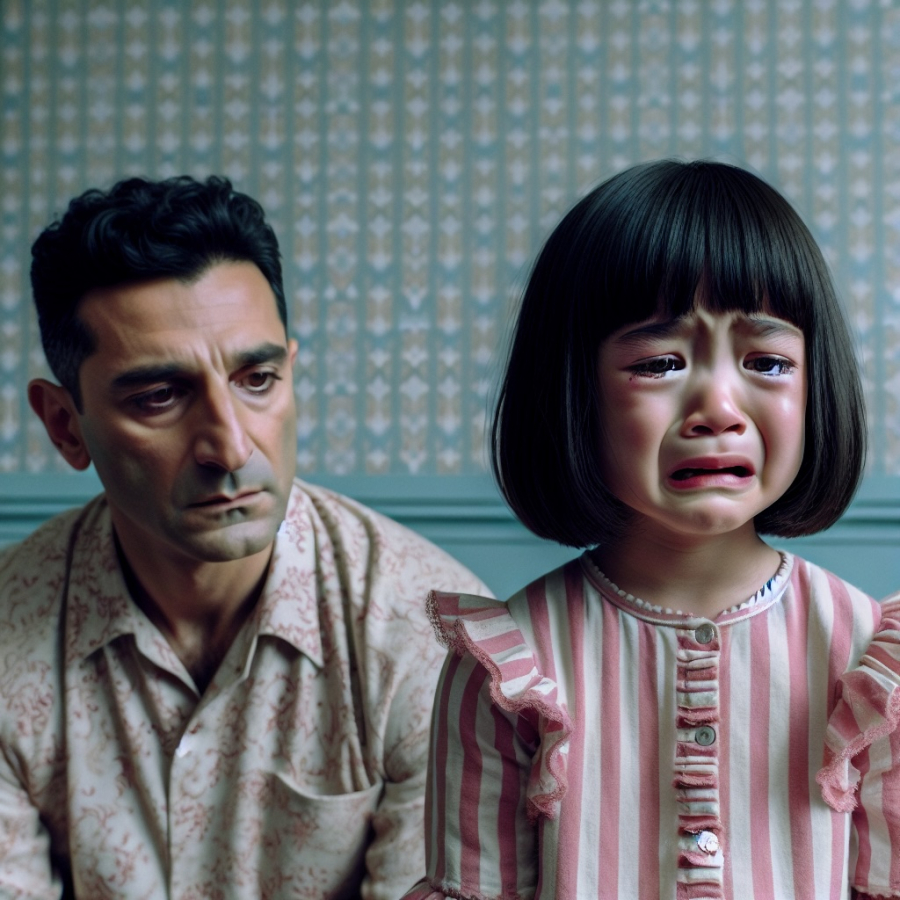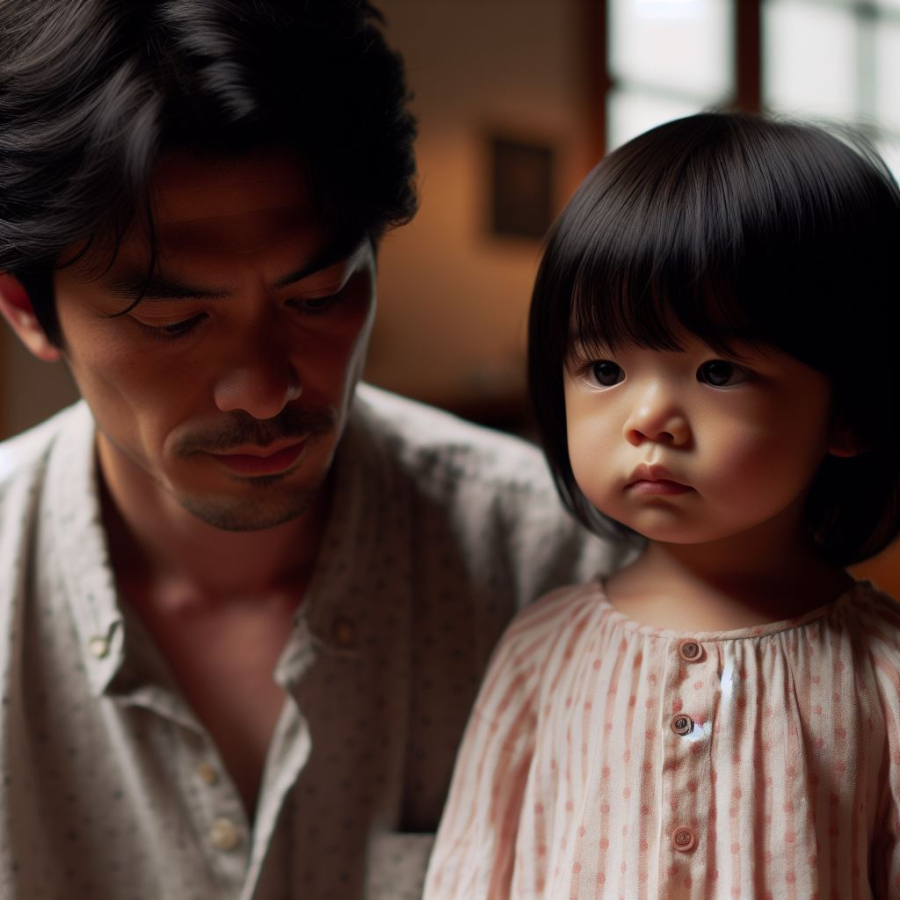It is inevitable that children cry and throw tantrums during their upbringing. However, the way parents react to these behaviors can significantly impact a child’s development. While some parents scold their children, and others spoil them, there are those who take a different approach, helping their children learn how to control their emotions and effectively solve problems.
A netizen from China shared an admirable way of parenting during a meeting:
“My friend’s daughter, Little Tian Tian, often plays with toys and leaves them scattered everywhere. When she can’t find a toy, she starts crying. Previously, my friend would clean up after her to avoid any trouble. But one time, when Little Tian Tian was crying because she couldn’t find a missing toy and her teddy bear fell to the ground, my friend came up with an idea. He said to her, ‘The teddy bear has played enough. Can you bring it to bed?’
Tian Tian agreed and carried the teddy bear to bed. My friend then gently suggested, ‘I don’t think the teddy bear can sleep comfortably like this every day. Do you think it has a regular sleeping place?’ She remembered that she would take the bear out of the basket and place it back where it belonged. Gradually, Tian Tian learned how to maintain order without even realizing it. My friend didn’t scold or punish her at all.

Crying and throwing tantrums is a normal part of parenting.
Instead of scolding when a child cries, many parents quickly impose their will in the hope that their children will be obedient like lambs. However, they fail to realize that this method does not solve the problem, and can even have negative effects on a child’s psychology. Children who are constantly criticized by their parents feel unsafe and are more prone to crying when faced with difficulties.
The scolding and imposition of parents can make children rebellious. Especially in public, it can hurt a child’s self-esteem and create resentment towards the parents. On the other hand, excessive indulgence can make children selfish, wanting everything their way, and become difficult to discipline in the future.
From the perspective of psychologist Winnicott, in order to cope with a child’s emotional fluctuations, the starting point should be the child’s heart and their intrinsic value. Parents should not focus solely on making the child stop crying or simply fulfilling all their demands. Instead, they should show empathy, allow the child to express their emotions freely, and help them feel understood and not alone. Through this, the child’s emotions will gradually become more positive.

The starting point should be the child’s heart and their intrinsic value.
When confronted with a crying child, parents should guide them gently but firmly. Here are some helpful methods:
Listen to the child
In moments when children express sadness or unease through tears, as a parent, the first and most important thing you can do is listen. Come alongside your child and create a safe space for them. A gentle hug is not only comforting but also sends a message of love, an invitation for the child to share their heart.
Once the tears have subsided, gently ask the child about the reasons behind the tears and listen to everything they want to say. By showing deep care and empathy towards the child’s emotions, you not only help them feel understood and accepted but also guide them in expressing and coping with their emotions in a healthy way.
Guide the child with kindness and firmness
In the journey of raising children, finding a balance between kindness and firmness is an art. The story of “Positive Discipline” reflects this through the example of a mother who decided to leave the room when her child exhibited inappropriate behavior, only to return once the child had calmed down. She approached her child with love and understanding, saying, “My dear, I am sorry for your anger. I always respect your emotions, but I cannot accept this behavior. From now on, if you do not respect me, I will need some time to calm down. These are the principles we will both follow. I love you very much and I am always here to help if you feel you can respect me.”

In the journey of raising children, finding a balance between kindness and firmness is an art.
Being firm in setting boundaries not only helps children learn how to deal with failure but also develops their self-respect and confidence. Parents should demonstrate firmness not through emotional reactions or imposition, but through consistency and fairness in every situation, nurturing an environment of respect and love.
Walk alongside your child in search of solutions
Occasionally, a child’s tears are an expression of failed efforts, when they want to achieve something but are limited by their abilities. This disappointment is inevitable. In such moments, parents can become guides, helping the child analyze and understand each issue, thus teaching them how to overcome challenges, developing self-esteem and problem-solving skills independently.
Over time, children will shift from emotional outbursts to facing challenges with courage and confidence.
Approach the issue with your child gently but decisively; the gentle attitude shows respect for the child’s emotions, while the firm attitude shows respect for the essence of the problem.
Parents’ reactions can significantly influence a child’s psychology and development. Constant criticism and scolding can make children feel unsafe and more prone to crying when faced with difficulties. It can also lead to rebellious behavior and hurt their self-esteem. On the other hand, excessive indulgence can foster selfishness and make discipline challenging in the future.
According to psychologist Winnicott, the starting point should be the child’s heart and their intrinsic value. Parents should focus on showing empathy and helping the child feel understood, rather than solely on stopping the crying or fulfilling all their demands.
- Listen: Create a safe space for your child to express their emotions. Offer a gentle hug and listen to their concerns.
- Guide with kindness and firmness: Find a balance between kindness and firmness. Set consistent and fair boundaries, demonstrating respect and love.
- Walk alongside your child: Help your child analyze and understand issues, teaching them problem-solving skills and building their self-esteem.
- Approach issues gently but decisively: Show respect for your child’s emotions while also addressing the problem firmly and decisively.
Learning Tips for Parents: 12 Japanese Techniques to Use with Your Children
 Children‘>
Children‘>Discover the 12 principles of teaching children in the traditional Japanese way that parents can learn with Dien May XANH! By instilling these principles when your children are young, you can ensure that they grow up to be obedient, smart and polite, the hallmarks of a successful education in Japan.
Girl Faces Criticism After Admitting Santa Claus Isn’t Real
Meet Charlie Hayes, a 22-year-old British girl who is making headlines for her bold confession to her child: Santa Claus isn’t real. Charlie’s honesty has sparked controversy, with many parents criticizing her for taking away the magic of Christmas. Despite the backlash, Charlie stands by her decision to tell her child the truth and believes that it’s important to be truthful with children, even if it means bursting their bubble of Santa Claus. Join us as we dive into the debate and explore the different perspectives on Santa Claus and the impact it has on children’s beliefs. Get ready for a thought-provoking discussion that challenges the traditional notions of Christmas and the role of Santa Claus in our lives.





































